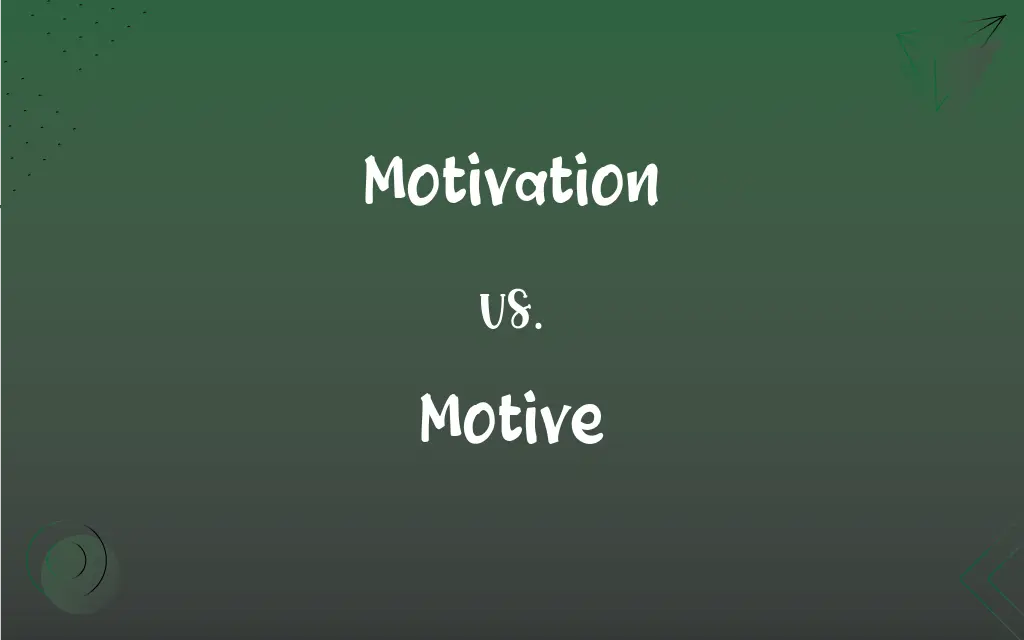Motivation vs. Motive: What's the Difference?
By Aimie Carlson & Harlon Moss || Updated on March 4, 2024
Motivation refers to the internal drive or process that initiates, guides, and maintains goal-oriented behaviors, while motive is a specific reason or desire that explains why an individual engages in a particular action.

Key Differences
Motivation is a broad, psychological concept that encompasses the various physiological, emotional, and cognitive processes that stimulate and direct human behavior towards achieving certain goals. It is dynamic and can be influenced by internal factors like needs, desires, and aspirations, as well as external factors such as rewards, social dynamics, and environmental conditions. Motive, on the other hand, is more specific and refers to the underlying reason behind an individual's action. It is a component of motivation that provides the rationale for why a person chooses to do something.
While motivation is the overarching drive that propels people towards or away from certain actions, motives are the individual reasons that lie within this framework. Understanding the difference between the two is essential in psychology, education, management, and personal development, as it helps in crafting strategies to enhance motivation by addressing specific motives.
Motivation is a complex, multi-faceted phenomenon that can be intrinsic, deriving from personal satisfaction or pleasure, or extrinsic, driven by external rewards or recognition. It involves a cycle of setting goals, working towards them, and adjusting efforts based on feedback and outcomes. Conversely, motives are often identified in the analysis of behavior, offering insights into personal preferences, decision-making processes, and personality. Identifying motives can be crucial for understanding conflicts, resolving interpersonal issues, and designing incentives in various settings.
While motivation encompasses the drive and processes behind goal-oriented behavior, motives provide the specific reasons that explain particular actions within this broader context.
Comparison Chart
Definition
The psychological processes that initiate, guide, and maintain goal-directed behaviors.
A specific reason or desire that explains why an individual engages in a particular action.
ADVERTISEMENT
Scope
Broad and dynamic, involving various internal and external factors.
Specific and situational, directly explaining an action.
Nature
Can be intrinsic or extrinsic, reflecting personal satisfaction or external rewards.
Tied to personal values, beliefs, and experiences.
Role
Drives persistence in behavior towards achieving goals.
Provides the rationale behind a particular action.
Application
Relevant in understanding and enhancing performance, persistence, and goal attainment.
Important for analyzing behavior and designing targeted incentives.
Motivation and Motive Definitions
Motivation
The drive to achieve goals.
Her motivation to become a doctor stemmed from a desire to help others.
ADVERTISEMENT
Motive
Can be influenced by values and beliefs.
Environmental concern was her motive for choosing a sustainable lifestyle.
Motivation
Influences persistence and effort.
Despite the challenges, his motivation led him to complete the marathon.
Motive
The reason behind an action.
His motive for volunteering was to gain new skills.
Motivation
Affects goal-setting and achievement.
Strong motivation is crucial for overcoming obstacles in personal projects.
Motive
Often personal and specific.
The athlete's motive for training was to set a world record.
Motivation
Dynamic and changes over time.
Her motivation to learn evolved from curiosity to a professional necessity.
Motive
Identifiable in behavior analysis.
Financial stability was identified as a key motive in career choices.
Motivation
Can be fueled by internal or external factors.
The promise of a bonus boosted his motivation at work.
Motive
An emotion, desire, physiological need, or similar impulse that acts as an incitement to action.
Motivation
The act or process of motivating
The coach's effective motivation of her players.
Motive
(mōtĭv, mō-tēv) A motif in art, literature, or music.
Motivation
The state of being motivated; having a desire or willingness to act
Students with a high level of motivation.
Motive
Causing or able to cause motion
Motive power.
Motivation
Something that motivates; an inducement, reason, or goal
“If your primary motivation in life is to be moral, you don't become an artist” (Mary Gordon).
Motive
Causing an action
Motive pleas.
Motivation
Willingness of action especially in behavior.
Motive
(obsolete) An idea or communication that makes one want to act, especially from spiritual sources; a divine prompting.
Motivation
The action of motivating.
Motive
An incentive to act in a particular way; a reason or emotion that makes one want to do something; anything that prompts a choice of action.
Motivation
Something which motivates.
Motive
A limb or other bodily organ that can move.
Motivation
An incentive or reason for doing something.
Motive
(law) Something which causes someone to want to commit a crime; a reason for criminal behaviour.
What would his motive be for burning down the cottage?
No-one could understand why she had hidden the shovel; her motives were obscure at best.
Motivation
(advertising) A research rating that measures how the rational and emotional elements of a commercial affect consumer intention to consider, visit, or buy something.
The motivation scores showed that 65% of people wanted to visit our website to learn more about the offer after watching the commercial.
Motive
A motif.
Motivation
The act or process of motivating.
Motive
(music) A motif; a theme or subject, especially one that is central to the work or often repeated.
If you listen carefully, you can hear the flutes mimicking the cello motive.
Motivation
The mental process that arouses an organism to action; as, a large part of a teacher's job is to give students the motivation to learn on their own.
Motive
(transitive) To prompt or incite by a motive or motives; to move.
Motivation
The goal or mental image of a goal that creates a motivation{2}; as, the image of a peaceful world is a powerful motivation for only a rare few individuals.
Motive
Causing motion; having power to move, or tending to move
A motive argument
Motive power
Motivation
The psychological feature that arouses an organism to action toward a desired goal; the reason for the action; that which gives purpose and direction to behavior;
We did not understand his motivation
He acted with the best of motives
Motive
Relating to motion and/or to its cause
Motivation
The condition of being motivated;
His motivation was at a high level
Motive
That which moves; a mover.
Motivation
The act of motivating; providing incentive
Motive
That which incites to action; anything prompting or exciting to choise, or moving the will; cause; reason; inducement; object; motivation{2}.
By motive, I mean the whole of that which moves, excites, or invites the mind to volition, whether that be one thing singly, or many things conjunctively.
Motive
The theme or subject; a leading phrase or passage which is reproduced and varied through the course of a comor a movement; a short figure, or melodic germ, out of which a whole movement is develpoed. See also Leading motive, under Leading.
Motive
That which produces conception, invention, or creation in the mind of the artist in undertaking his subject; the guiding or controlling idea manifested in a work of art, or any part of one.
Motive
Causing motion; having power to move, or tending to move; as, a motive argument; motive power.
Motive
To prompt or incite by a motive or motives; to move.
Motive
The psychological feature that arouses an organism to action toward a desired goal; the reason for the action; that which gives purpose and direction to behavior;
We did not understand his motivation
He acted with the best of motives
Motive
A theme that is elaborated on in a piece of music
Motive
Causing or able to cause motion;
A motive force
Motive power
Motor energy
Motive
Impelling to action;
It may well be that ethical language has primarily a motivative function
Motive pleas
Motivating arguments
Motive
Explains behavior in given contexts.
Seeking approval was the motive behind his compliance.
FAQs
Is motivation always positive?
Motivation can be positive or negative, driving individuals towards desirable outcomes or away from undesirable ones, depending on the individual's goals and perceptions.
How do motives relate to needs and desires?
Motives are often derived from needs and desires, serving as the specific reasons that channel these drives into actionable behavior.
Can motives be unconscious?
Yes, motives can be unconscious, influencing behavior without the individual's explicit awareness of the underlying reasons.
Do motives change over time?
Motives can change based on personal growth, experiences, and shifting priorities, reflecting the dynamic nature of human behavior.
How is motivation measured?
Motivation is measured through various methods, including psychological assessments, performance outcomes, and self-report instruments, focusing on intensity, direction, and persistence of behavior.
Can the same motivation have different motives?
Yes, individuals can share a common motivation but have different motives, as personal reasons for pursuing a goal can vary.
Can a lack of motivation be a symptom of psychological conditions?
Yes, a lack of motivation can be a symptom of psychological conditions like depression, anxiety, or burnout, highlighting the importance of mental health in motivational processes.
What role does motivation play in education?
In education, motivation is crucial for student engagement, learning, and achievement, influencing both the effort and strategies students use to meet academic challenges.
What impact does motivation have on personal relationships?
In personal relationships, motivation affects the level of commitment, the effort put into communication and conflict resolution, and the pursuit of shared goals, influencing relationship satisfaction and longevity.
How can understanding motives improve motivation?
Understanding specific motives allows for tailored strategies that align with individual desires and values, enhancing overall motivation.
Why is understanding employee motivation important in the workplace?
Understanding employee motivation is key to enhancing productivity, satisfaction, and retention, as it allows managers to align work roles and rewards with individual drivers and goals.
How do cultural factors influence motivation and motives?
Cultural factors can significantly influence both motivation and motives, as societal values, norms, and expectations shape what individuals find motivating and their reasons for pursuing specific goals.
Are motives always aligned with ethical standards?
Not necessarily; while many motives are ethically neutral or positive, some can lead to unethical behavior if they prioritize personal gain over moral or societal norms.
Can external rewards undermine intrinsic motivation?
External rewards can sometimes undermine intrinsic motivation, especially if they shift focus away from personal satisfaction to external incentives.
How do educational systems influence student motivation?
Educational systems influence student motivation through curriculum design, teaching methods, assessment practices, and the learning environment, impacting students' engagement and achievement.
What role does leadership play in motivating teams?
Leadership plays a crucial role in motivating teams by setting a vision, creating a supportive environment, recognizing achievements, and aligning individual motives with team and organizational goals.
How can motivation be improved?
Motivation can be improved by setting clear, achievable goals, finding personal relevance in tasks, seeking feedback, celebrating progress, and addressing any underlying psychological barriers.
What is the difference between short-term and long-term motivation?
Short-term motivation focuses on immediate goals with quick rewards, while long-term motivation is driven by more distant, enduring objectives, requiring sustained effort and persistence.
How does stress affect motivation and motives?
Stress can either enhance motivation by acting as a motivator to overcome challenges or hinder it by overwhelming an individual's capacity to pursue goals, depending on the nature and perception of the stressor.
How do motivations differ between individuals?
Motivations differ due to individual differences in personality, life experiences, values, and needs, leading to varied goals and the intensity of the drive towards achieving them.
About Author
Written by
Aimie CarlsonAimie Carlson, holding a master's degree in English literature, is a fervent English language enthusiast. She lends her writing talents to Difference Wiki, a prominent website that specializes in comparisons, offering readers insightful analyses that both captivate and inform.
Co-written by
Harlon MossHarlon is a seasoned quality moderator and accomplished content writer for Difference Wiki. An alumnus of the prestigious University of California, he earned his degree in Computer Science. Leveraging his academic background, Harlon brings a meticulous and informed perspective to his work, ensuring content accuracy and excellence.































































